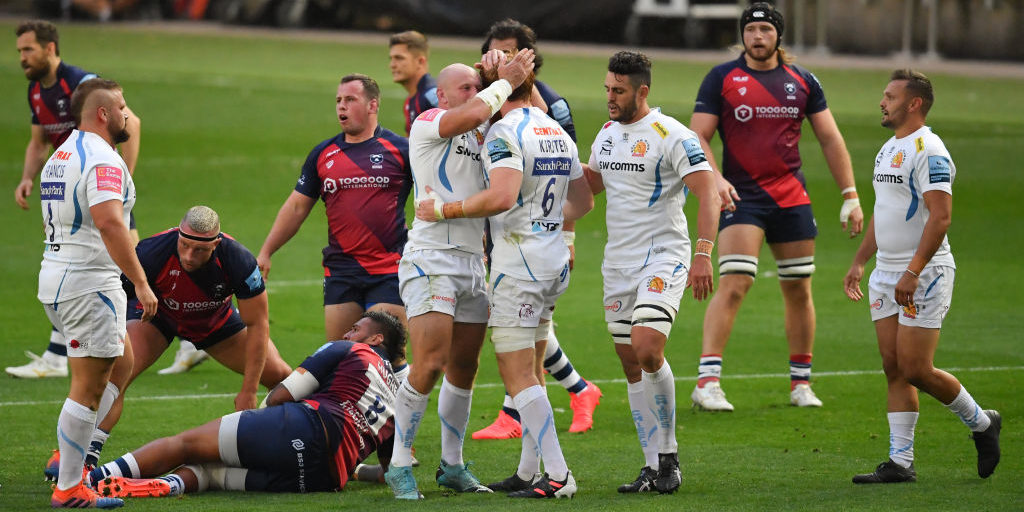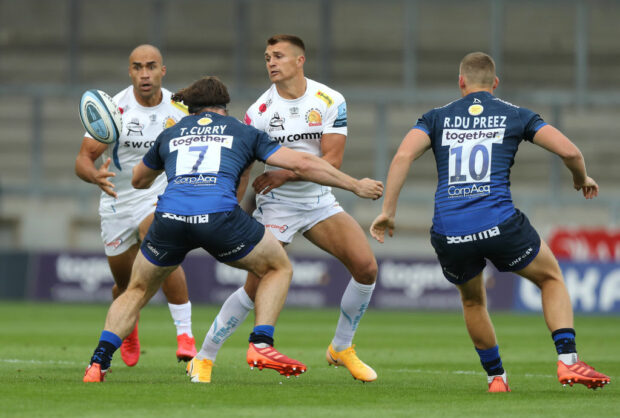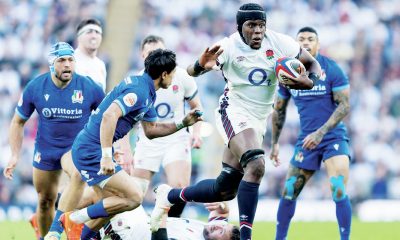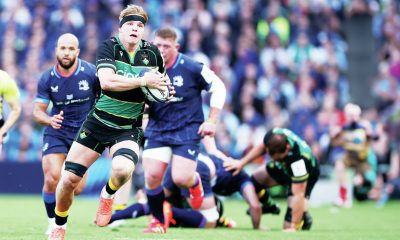
EXETER have blown me away since the restart, because it appears already that the Premiership is a one-horse race. The Chiefs have found multiple ways to win, like Saracens did before them.
Exeter’s win over a full strength Bristol with a second string side in midweek at Ashton Gate said it all. It was a decent Exeter pack, and backs like Phil Dollman and Olly Woodburn lit up the game with their strike running, as did Josh Hodge, their England U20 full-back.
Hodge is a tasty young talent, very elusive, and it is good to see players like him, who would normally get very little Premiership game time, being given the opportunity to learn – and he showed he learns quickly.
The complete commitment from the Exeter team stood out, and in a good contest they were as one, with every Chiefs player scoring at least 7/10 against second-placed Bristol. With their strongest line-up at its best, and Saracens relegated, I don’t believe any other Premiership club can get near them without a 20-point start.
Exeter won’t want to hear it because of the knock-out stage to come, but this title race is done. Although the semi-finals and final are still to come, they have found a level of intensity and accuracy that has set them apart from the rest, in the same way as Saracens did.
It is easy to recall when Saracens were overpowered by Toulon in their first European Cup final, but after that they overpowered everyone else – and now Exeter are doing the same in the Premiership, and are favourites to secure a European Cup semi-final.
It’s impressive, and Exeter have developed the same ability to outmanoeuvre defences. In many ways they make attack look like a game of noughts and crosses, where they create the option of two simultaneous chances to win. They stretch the opposition defence so that when it chooses to defend one of the options, they score from the other.
If you look at Saracens and the impact they have had in Europe from 2016 to 2019, when they were almost unbeatable, it is clear Exeter are on a similar mission. Both sides hit hard close to the breakdown and because most other teams over play that, those playing Exeter or Saracens think they will keep hitting up in that area and switch off defensively. Their defence bites-in and goes narrow – with the wing having to step in – leaving space out wide.

England don’t do it quite as well as Exeter and Saracens, who tend to first hit-the-ball-up and recycle from the ruck before giving it to the second attacking line. They then go wide with their blindside wing taking the ball outside the second receiver – and there’s the chess battle which draws the defending wing in-field.
It makes me wonder why England don’t do it more often, especially with players like Henry Slade, Jack Nowell and Owen Farrell in the team, and Manu Tuilagi as an extra hard-carrying foil in the same way that Brad Barritt is for Saracens.
At the moment, Eddie Jones sees Farrell as essential to England as a backline organiser, but if he picks George Ford at 10 and Manu Tuilagi at 13, as he did in the 2019 World Cup final, then there is no place in the starting line-up for Henry Slade – and it is often the quality of the Exeter outside centre’s passing that creates the scoring chances when defending wings are caught in two minds.
Slade was involved in two tries during Exeter’s away win at Sale and Sam Simmond’s score stood out for me. In the build up, Slade initially sent a lovely long, deft pass wide that got them in behind the Sale defence. Then a couple of phases later he slipped a pass inside to Olly Woodburn who passed to Simmonds to score.
The Chiefs engineered another scoring chance in the same way against Bristol, and if Tom O’Flaherty had been able to get his pass away Exeter would have had another try.
The Chiefs’ fly-half Joe Simmonds is attracting plenty of praise, and is being seen as a potential rival for Farrell and Ford. My sense is that Simmonds is steady, but may not be quite as free-flowing as Ford, who is also the best tactical kicker out of the three. By contrast, Farrell is still the big game player who can be having a shocker, but puts it to one side and pulls something world-class out of the bag. That’s why he has been picked for the Lions where Ford has not.
Simmonds just needs a chance to show what he can do, but at the moment my hunch is that Farrell and Ford would be picked before the Exeter fly-half by most Premiership club coaches if they were all on the market now. However, if Simmonds continues to play as well as he has for Exeter for the coming season, and continues to improve, that’s going to change.
There are also good signs in some of the other Premiership teams, although they do not have Exeter’s quality. Neal Hatley has got the Bath forwards rumbling since he returned to the Rec, and the pack is far stronger and more cohesive following his learnings with England.
Bath are incomplete in terms of their overall game, but they are getting close to having another replaceable front five, as they did in 2015, and their Bank Holiday game against an improved Wasps side has all the signs of a play-off decider.
When Jones came in as England coach in 2015 he had his own ideas about how they should play, but his big thing was fitness. He put a massive emphasis on England not being up to international standard, and I remember hearing a story of him taking the Mickey out of Ben Youngs in particular for not being fit enough.
The bonus for Jones was that Saracens initially, and now Exeter, have helped that improvement by producing well-conditioned packs that can play with the intensity and force required to outmuscle most rivals – although they could not manage it against South Africa in the World Cup final.
If you look at the intellectual property that Exeter and Saracens provide Jones, there is no question that England can definitely compete as one of the top three international teams in the world at the moment.
The arrival of props like the Bath duo Beno Obano and Will Stuart to compete with Mako Vunipola, Kyle Sinckler and Harry Williams, as well as having Jamie George and Luke Cowan-Dickie at hooker, means that the front five should be good enough to handle most teams.
Combine that with the impact that Ben Spencer has had at scrum-half since arriving at Bath, and it looks promising. It’s rumoured Spencer has been criticised for not being vocal enough, but he has shown at Bath that he is a good communicator, and has a box kick that hits the bull’s-eye almost every time.
You put that together with the outside backs that England have – whether it’s Nowell, Slade, Tuilagi, Joe Cokanasiga, Jonny May, Elliot Daly, Anthony Watson or Jonathan Joseph – and you have close to all the attacking weapons you need.


British and Irish Lions
Charlie Elliott: The 17 backs I would select for the British and Irish Lions

























You must be logged in to post a comment Login